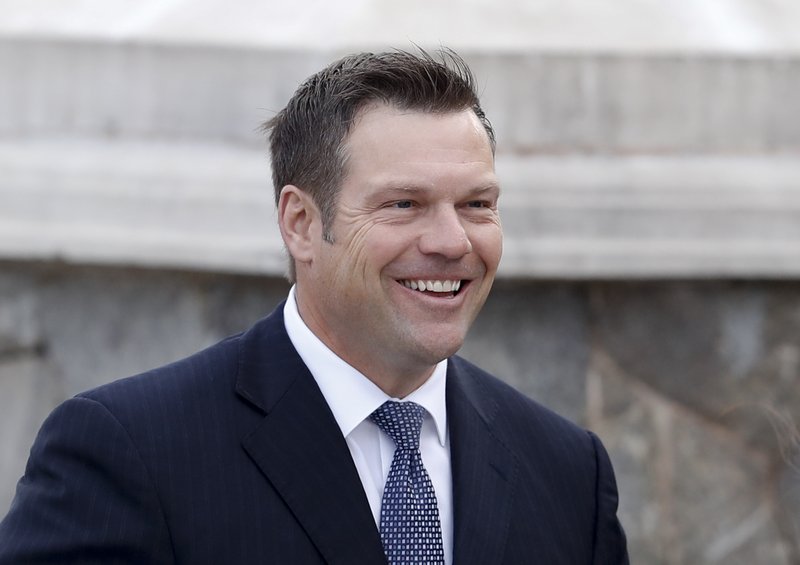WASHINGTON -- President Donald Trump signed an executive order Thursday creating a commission to review alleged voter fraud and voter suppression, building upon his claims that millions of people voted illegally in the 2016 election.
The White House said the president's Advisory Commission on Election Integrity would examine allegations of improper voting and fraudulent voter registration across the nation. Vice President Mike Pence will lead the panel, and Kansas Secretary of State Kris Kobach will be vice chairman of the commission, which will report back to Trump by 2018.
"We can't take for granted the integrity of the vote," Pence said in a statement. He said the commission would "review ways to strengthen the integrity of elections in order to protect and preserve the principle of one person, one vote because the integrity of the vote is the foundation of our democracy."
Trump has alleged that 3 million to 5 million people voted illegally in the 2016 presidential election in which he faced Democrat Hillary Clinton. He has vowed since the start of his administration to investigate voter fraud, a process that has been delayed for months.
[PRESIDENT TRUMP: Timeline, appointments, executive orders + guide to actions in first 100 days]
In November, Kobach said he supported Trump's assertions that he would have won the popular vote if "millions" of people hadn't voted illegally.
Democrats and voting-rights groups called the panel a sham, arguing that there are few, if any, credible allegations of significant voter fraud. They warned that the panel would be used to lay the groundwork for stricter voting requirements that could make it more difficult for poor and minority-group voters to access the ballot box.
"The sole purpose of this commission is to propagate a myth and to give encouragement to Republican governors and state legislators to increase voter suppression," said Sen. Bernie Sanders, I-Vt., who challenged Clinton for the Democratic presidential nomination.
Senate Democratic Leader Charles Schumer of New York said it was a "clear front for constricting the access to vote to poor Americans, older Americans, and -- above all -- African-Americans and Latinos."
White House spokesman Sarah Huckabee Sanders said the commission would be bipartisan and composed of about a dozen members, including current and former state election officials and experts.
"The president is committed to the thorough review of registration and voting issues in federal elections, and that's exactly what this commission is tasked with doing," Sanders said.
The panel will aim to ensure confidence in the integrity of federal elections while looking at vulnerabilities in the system and the possibility of improper voting and fraudulent voter registration and voting, officials said.
The commission will include two Republicans, former Ohio Secretary of State Ken Blackwell and Indiana Secretary of State Connie Lawson, and two Democrats, New Hampshire Secretary of State Bill Gardner and Maine Secretary of State Matthew Dunlap.
Christy McCormick, a former Justice Department attorney and a member of the U.S. Election Assistance Commission, also will be on the panel, and others will be named soon.
During his campaign, Trump repeatedly alleged that the election system was "rigged" and later argued that widespread fraud kept him from winning the popular vote. Trump won the presidency with an Electoral College victory even though Clinton received nearly 3 million more votes than he did.
Voting experts and many lawmakers, including House Oversight Committee Chairman Jason Chaffetz, have said they haven't seen anything to suggest that millions of people voted illegally. The Utah Republican said his committee won't be investigating voter fraud.
But in a lunch meeting with senators in February, Trump said he and former Republican Sen. Kelly Ayotte would have won in New Hampshire if not for voters bused in from out of state. New Hampshire officials have said there was no evidence of major voter fraud in the state.
Trump had previously identified Pence as the person to oversee the commission. Kobach advised Trump's transition team and has been a leading GOP proponent of tighter voting regulations.
The secretary of state championed Kansas' proof-of-citizenship requirement as an anti-fraud measure that keeps noncitizens from voting, including foreigners living in the U.S. illegally.
Critics contend that it suppresses voter turnout, particularly young and minority-group voters, and that there have been few cases of fraud.
After the announcement, the American Civil Liberties Union said it had filed a Freedom of Information Act request seeking information on what the Trump administration was using as the basis for its voter-fraud claims.
A Section on 05/12/2017
